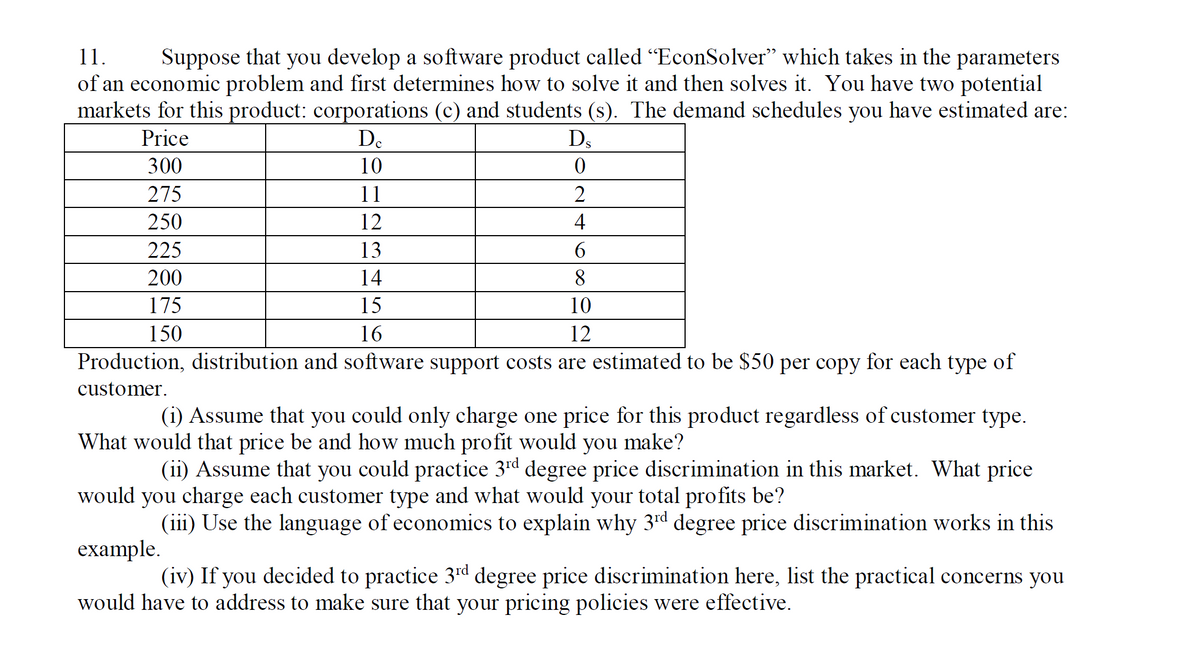11. Suppose that you develop a software product called "EconSolver" which takes in the parameters of an economic problem and first determines how to solve it and then solves it. You have two potential markets for this product: corporations (c) and students (s). The demand schedules you have estimated are: Price Dc 300 10 275 11 250 12 225 13 200 14 175 15 150 16 Ds 0 2 4 6 8 10 12 Production, distribution and software support costs are estimated to be $50 per copy for each type of customer. (i) Assume that you could only charge one price for this product regardless of customer type. What would that price be and how much profit would you make? (ii) Assume that you could practice 3rd degree price discrimination in this market. What price would you charge each customer type and what would your total profits be? (iii) Use the language of economics to explain why 3rd degree price discrimination works in this example.
11. Suppose that you develop a software product called "EconSolver" which takes in the parameters of an economic problem and first determines how to solve it and then solves it. You have two potential markets for this product: corporations (c) and students (s). The demand schedules you have estimated are: Price Dc 300 10 275 11 250 12 225 13 200 14 175 15 150 16 Ds 0 2 4 6 8 10 12 Production, distribution and software support costs are estimated to be $50 per copy for each type of customer. (i) Assume that you could only charge one price for this product regardless of customer type. What would that price be and how much profit would you make? (ii) Assume that you could practice 3rd degree price discrimination in this market. What price would you charge each customer type and what would your total profits be? (iii) Use the language of economics to explain why 3rd degree price discrimination works in this example.
Chapter17: Capital And Time
Section: Chapter Questions
Problem 17.10P: Wonopoly and natural resource prices Suppose that a firm is the sole owner of a stock of a natural...
Related questions
Question

Transcribed Image Text:11.
Suppose that you develop a software product called "EconSolver" which takes in the parameters
of an economic problem and first determines how to solve it and then solves it. You have two potential
markets for this product: corporations (c) and students (s). The demand schedules you have estimated are:
Price
Dc
10
11
12
13
14
15
16
DS
0
2
4
6
8
10
12
Production, distribution and software support costs are estimated to be $50 per copy for each type of
customer.
300
275
250
225
200
175
150
(i) Assume that you could only charge one price for this product regardless of customer type.
What would that price be and how much profit would you make?
(ii) Assume that you could practice 3rd degree price discrimination in this market. What price
would you charge each customer type and what would your total profits be?
(iii) Use the language of economics to explain why 3rd degree price discrimination works in this
example.
(iv) If you decided to practice 3rd degree price discrimination here, list the practical concerns you
would have to address to make sure that your pricing policies were effective.
Expert Solution
This question has been solved!
Explore an expertly crafted, step-by-step solution for a thorough understanding of key concepts.
This is a popular solution!
Trending now
This is a popular solution!
Step by step
Solved in 5 steps

Follow-up Questions
Read through expert solutions to related follow-up questions below.
Follow-up Question
Please answer part (iv) of the above question
Solution
Knowledge Booster
Learn more about
Need a deep-dive on the concept behind this application? Look no further. Learn more about this topic, economics and related others by exploring similar questions and additional content below.Recommended textbooks for you


Principles of Microeconomics
Economics
ISBN:
9781305156050
Author:
N. Gregory Mankiw
Publisher:
Cengage Learning



Principles of Microeconomics
Economics
ISBN:
9781305156050
Author:
N. Gregory Mankiw
Publisher:
Cengage Learning
